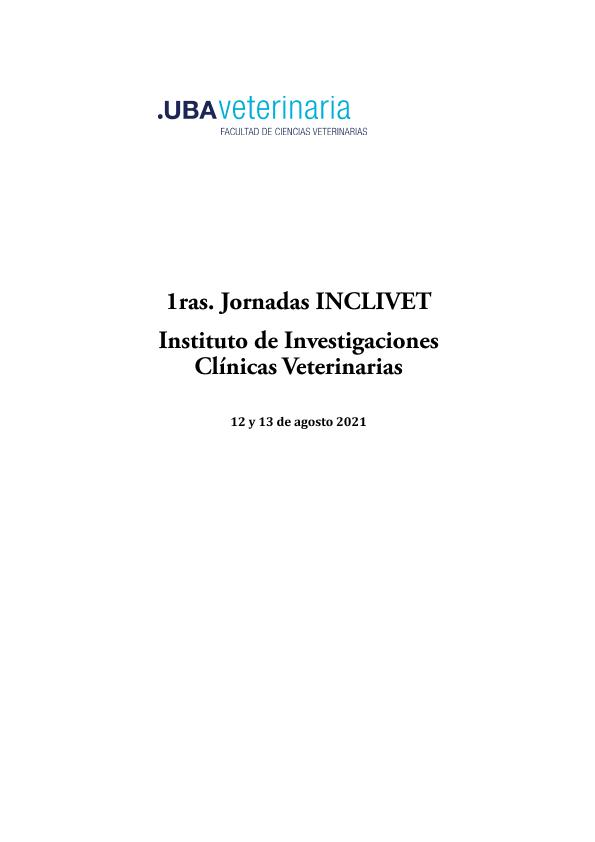Evento
Clinical, cytologic and microbiological evidence of pyoderma recovery in dogs with demodicosis without antimicrobial therapy
Martínez, Sofía ; Cacciato, Claudio Santiago; Fogel, Fernando Adrián; Maté, María Laura
; Cacciato, Claudio Santiago; Fogel, Fernando Adrián; Maté, María Laura ; Sanchez Bruni, Sergio Fabian
; Sanchez Bruni, Sergio Fabian ; del Sole, Maria Jose
; del Sole, Maria Jose
 ; Cacciato, Claudio Santiago; Fogel, Fernando Adrián; Maté, María Laura
; Cacciato, Claudio Santiago; Fogel, Fernando Adrián; Maté, María Laura ; Sanchez Bruni, Sergio Fabian
; Sanchez Bruni, Sergio Fabian ; del Sole, Maria Jose
; del Sole, Maria Jose
Tipo del evento:
Jornada
Nombre del evento:
1ras. Jornadas del Instituto de Investigaciones Clínicas Veterinarias
Fecha del evento:
12/08/2021
Institución Organizadora:
Universidad de Buenos Aires. Facultad de Ciencias Veterinarias. Instituto de Investigaciones Clínicas Veterinarias;
Título de la revista:
Invet
Editorial:
Universidad de Buenos Aires. Facultad de Ciencias Veterinarias
ISSN:
1514-6634
e-ISSN:
1668-3498
Idioma:
Inglés
Clasificación temática:
Resumen
Generalized pustular canine demodicosis is the result of an overpopulation of mites of Demodex spp. commonly associated with infection by Staphylococcus spp., normal inhabitants of the skin of most mammals. Both microorganisms proliferate within the hair follicles causing follicular hyperkeratosis in the head, trunk and legs. Dermatological examination reveals signs such as erythema, alopecia, folliculitis and furunculosis. The diagnosis is confirmed by skin scraping and cytology of the lesions, microscopically identifying mites and inflammatory cells with cocci, respectively. In the past, systemic antibiotic therapy was supported for all dogs with secondary bacterial infection. Nowadays, as the incidence of skin infections with multi-resistant bacteria is increasing, a judicious use of systemic antibiotics is recommended. Thus, the Clinical Practice Guidelines on Demodicosis Treatment (2020) recommend topical antibiotic therapy in dogs with generalized demodicosis up to 1-2 weeks after clinical and cytologic resolution of the skin infection. The main goal of this study was to assess the clinical-cytological evolution and bacteriological cure of canines with generalized demodicosis treated only with acaricides. For this purpose, 7 (seven) patients with pustular demodicosis were admitted for their attention at the Teaching Hospital of Small Animals (HEPA). On day 0, the animals were clinically evaluated and clinical score awarded; cytological test and skin swabs were obtained from lesions. Then, patients initiated a non-antibiotic treatment as follow: 4 (four) dogs were treated with afoxolaner at a dose of 2.7-6.9 mg/kg on day 0 and day 28, and 3 (three) dogs were treated with oral ivermectin at a dose of 0.5 mg/kg/24 h for 63 days. On days 14, 35 and 56 post-treatment, clinical score and cytological results were recorded and sample swabs from skin lesions were obtained. Cytology samples were stained with Giemsa Merck® by conventional technique and observed microscopically by the same dermatologist. Sample swabs were stored in Stuart medium up to overnight growth on Tryptic Soy Agar medium supplemented with 10% sterile bovine blood and the phenotypic identification bacterial strains were performed by conventional biochemical techniques. Clinical score (mean +/- DE) decreased considerably throughout the treatment as follows: 31.8 +/- 3.4, 28.0 +/- 5.4, 13.2 +/- 5.0, and 4.8 +/- 1.5 on day 0, 14, 35 and 56, respectively. Cytology with pyoderma characteristics were positive at days 0 and 14 post-treatment in all dogs, and became negative in 5 dogs at day 35, being negative in all dogs (6) at day 56 . Staphylococcus spp. were isolated from skin samples in all dogs on days 0 and became negative in 6 dogs at day 56 post-treatment. In conclusion, these preliminary results propose that pyoderma associated with canine demodicosis could resolve clinical, cytological and bacteriologically with single acaricidal therapy, avoiding systemic or topical antibiotic therapy.
Palabras clave:
DEMODICOSIS
,
PYODERMA
,
ANTIBIOTIC
Archivos asociados
Licencia
Identificadores
Colecciones
Eventos(CIVETAN)
Eventos de CENTRO DE INVESTIGACION VETERINARIA DE TANDIL
Eventos de CENTRO DE INVESTIGACION VETERINARIA DE TANDIL
Citación
Clinical, cytologic and microbiological evidence of pyoderma recovery in dogs with demodicosis without antimicrobial therapy; 1ras. Jornadas del Instituto de Investigaciones Clínicas Veterinarias; Argentina; 2021; 52-52
Compartir



